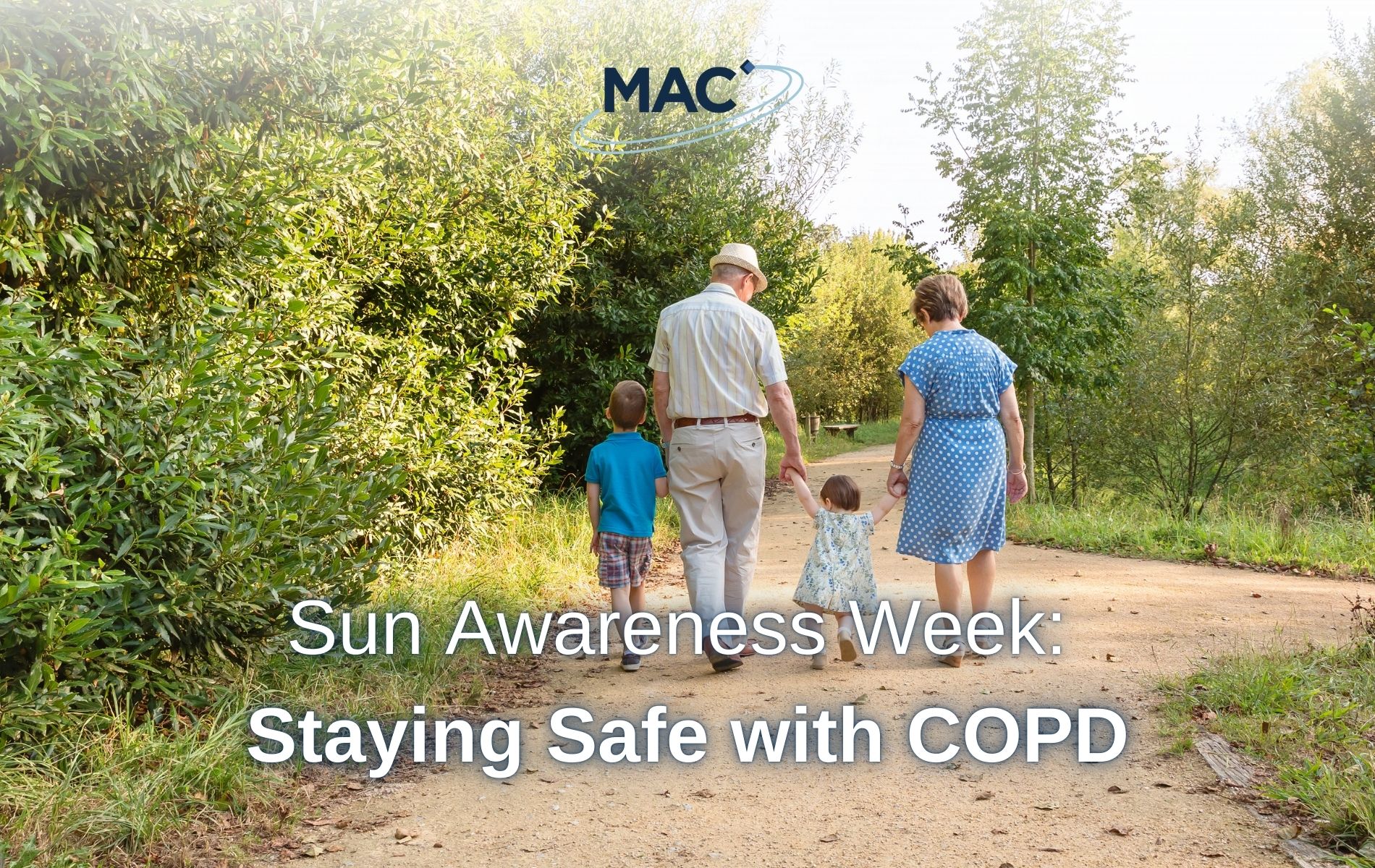Sun Awareness Week serves as an important reminder of the risks associated with sun exposure, particularly for those living with chronic lung conditions like Chronic Obstructive Pulmonary Disease (COPD).
While sunshine can boost vitamin D levels and improve mood, excessive heat and strong sunlight can pose serious health risks for people with COPD. Understanding these risks and taking preventive measures can help those with COPD stay safe and enjoy the summer months without compromising their health.
What is COPD?
COPD encompasses two main conditions: chronic bronchitis and emphysema. Chronic bronchitis involves inflammation of the airways and excessive mucus production, while emphysema causes damage to the air sacs in the lungs, reducing oxygen exchange. Around 1.2 million people in the UK are living with this condition1.
The primary cause of COPD is long-term exposure to lung irritants, such as air pollution, or occupational hazards like dust and chemicals. The foremost cause of COPD, however, is smoking, accounting for about 70% of COPD cases2.
Genetics also play a role; for instance, alpha-1 antitrypsin deficiency (AATD) can increase susceptibility to the disease. Up to 3% of people living with COPD have AATD3.
How Heat and Sun Affect COPD
COPD affects the lungs and makes breathing more difficult, and hot weather can worsen symptoms (exacerbations) in several ways:
- Increased Air Pollution – Heat often increases air pollution and smog levels, which can irritate the lungs and worsen breathing difficulties. Research has found that air pollutants like PM2.5, PM10, and NO2 are linked to increased COPD exacerbations and hospitalisations4.
- Dehydration – High temperatures can lead to dehydration, making mucus in the lungs thicker and harder to clear, leading to a higher risk of infections and exacerbations.
- Humidity – Hot and humid air can make it harder to breathe, as heavy, moisture-laden air requires more effort for the lungs to process.
- Overheating and Fatigue – COPD already causes fatigue, and overheating can worsen exhaustion, dizziness, and shortness of breath.
- Medication Sensitivity – Some COPD medications can increase sensitivity to heat and dehydration, making it even more important to stay cool and hydrated.
Tips for Staying Safe in the Sun
If you are living with COPD, it’s important to take extra precautions when the temperature rises. Here are some essential tips to help you stay safe and comfortable:
- Stay Hydrated – Drink plenty of water throughout the day to prevent dehydration and help keep mucus thin and easy to clear from your lungs. It’s recommended that those living with COPD should drink around 6-8 glasses of water per day5.
- Avoid Peak Sun Hours – The sun is strongest between 11 am and 3 pm. Try to stay indoors during these hours or seek shade if you need to be outside.
- Dress Appropriately – Wear lightweight, loose-fitting clothing and a wide-brimmed hat to protect yourself from direct sunlight.
- Monitor Air Quality – Check the air quality index (AQI) before going outside. On days when pollution levels are high, stay indoors and keep windows closed.
- Take Breaks and Rest – Don’t overexert yourself in the heat. Take frequent breaks and find cool spots to sit and recover.
Improving Quality of Life for people with COPD
Living with COPD requires extra caution during hot and sunny weather, but with the right precautions, you can still enjoy the outdoors safely.
Here at MAC Clinical Research, we are committed to improving quality of life for people living with COPD through clinical trials investigating potential new treatments. If you are aged 40 to 75 with COPD, you could be eligible to take part in a new COPD clinical trial.
Eligible participants will receive up to £2425 for their time and commitment, plus reasonable travel expenses or transport to clinic visit provided.
For more information and to see if you could be eligible, register your interest via our COPD study page.
1 NHS – Digital service to manage high-risk chronic obstructive pulmonary disease (COPD) patients
2 World Health Organization – Smoking is the leading cause of chronic obstructive pulmonary disease
3 Canadian Medical Association Journal – Alpha-1 antitrypsin deficiency: a commonly overlooked cause of lung disease
4 The European Respiratory Journal – Air pollution, lung function and COPD: results from the population-based UK Biobank study
5 American Lung Association – Nutrition and COPD




